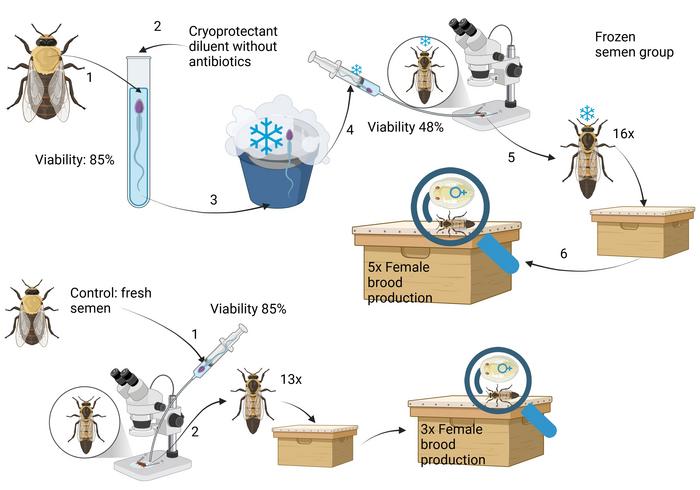
Researchers at the University of Liège have made a groundbreaking advancement in the field of bee insemination. In a pioneering study as part of the FreezeBEE project, they have successfully demonstrated that it is possible to produce female brood using frozen semen, and notably, they managed to achieve this without adding any antibiotics. This significant achievement not only showcases a crucial innovation in apiculture but also opens new avenues for biodiversity conservation and agricultural sustainability.
The established methods for cryopreservation of bee semen have historically faced challenges, especially concerning viability and reproducibility. Traditional protocols often involved complex, multi-step procedures that relied heavily on the use of antibiotics, limiting their effectiveness and introducing potential complications. However, the University of Liège researchers have proposed an antibiotic-free method that simplifies the freezing process while maintaining a high viability rate for the semen.
Cryopreservation of drone semen is a critical area of study in the context of bee conservation. Bees are vital pollinators, playing an indispensable role in agricultural production and ecosystem stability. The drastic decline in bee populations globally has raised alarms within the scientific community, prompting extensive efforts to develop effective preservation strategies. In this new study, researchers collected drone semen, which was then divided into two groups: one group was inseminated fresh, while the other was frozen for later use. The results of this study could have far-reaching implications for beekeeping practices.
Sophie Egyptien, a leading doctoral researcher on the project, emphasized the importance of conserving bee populations and genetic diversity. By preserving drone semen, beekeepers can maintain the genetic integrity of their colonies, safeguarding against diseases and other threats. The team’s results indicate that even while facing significant sperm viability loss during freezing—about 37%—they were still able to produce viable female brood. This demonstrates a remarkable achievement in ensuring that frozen resources can yield beneficial outcomes.
The researchers’ method relies on using cryoprotectants—substances that protect biological samples from damage due to freezing and thawing. Unlike previous, more cumbersome technologies, this new approach incorporates a simple dilution process that is efficient yet effective. Cryoprotectants, such as egg yolk, limit ice formation during the freezing process, which is crucial for maintaining cell structures and overall semen viability. This straightforward method could significantly increase accessibility for beekeepers and researchers alike.
Additionally, the findings from this study promote greater accessibility to genetic materials that may be otherwise lost during the risky transportation of live bees. By enabling the freezing of high-quality semen from disease-resistant or locally adapted strains, beekeepers can enhance the health and sustainability of their colonies. Moreover, this technique could offer solutions during times when bee breeding periods are limited.
This study stands out not only in its technological implications but also because it marks a significant milestone in Belgium’s scientific contributions to beekeeping practices. The researchers leveraged advanced microscopy techniques to undertake precise analyses of sperm quality, guaranteeing that their results were grounded in solid scientific methodology.
Despite the promising results, the team recognizes that further refinement is essential. Efforts will be directed toward optimizing the concentrations of cryoprotectants used in the semen preservation process. In addition, understanding the long-term effects of this method on queen survival and brood production is crucial for further validation of this innovation.
As global food supply and ecosystem stability increasingly depend on healthy pollinator populations, research like this is vital. The introduction of an antibiotic-free, effective cryopreservation protocol could revolutionize apiculture practices, providing beekeepers with the tools necessary to combat challenges arising from declining bee populations.
Moreover, this advancement in bee reproductive technology has wider implications in biodiversity conservation. By maintaining the genetic variability within bee populations, researchers can help mitigate the risk of extinction, ensuring the survival of these essential pollinators for generations to come.
In summary, the breakthrough achieved by the University of Liège researchers represents a significant leap forward in the conservation and management of bee populations. As the world faces mounting challenges concerning agricultural sustainability and ecological balance, embracing innovations such as this one could be critical in turning the tide.
By utilizing this new cryopreservation technique, researchers not only showcase a promising research avenue but also highlight the urgent need for sustainable practices that prioritize the health of pollinators, ultimately ensuring food security and ecological stability.
In a time when the plight of bees is increasingly apparent, the efforts of these scientists stand as a beacon of hope, echoing the message that with innovation and dedication, effective solutions are within reach.
Subject of Research: Cryopreservation of Drone Semen
Article Title: Evaluation of a Simple Antibiotic-Free Cryopreservation Protocol for Drone Semen
News Publication Date: January 7, 2025
Web References: University of Liège, DOI
References: None available
Image Credits: University of Liège / Sophie Egyptien
Keywords: Bee Conservation, Cryopreservation, Drone Semen, Apiculture, Antibiotic-Free, Biodiversity, Reproductive Technology, Genetics, Pollinators.
Tags: agricultural sustainability practicesantibiotic-free bee reproductionbee insemination techniquesbee population decline solutionsbiodiversity conservation methodscryopreservation of bee semendrone semen collection techniquesFreezeBEE project advancementsfrozen semen technologyinnovative apiculture methodspollinator importance in ecosystemsUniversity of Liège research





